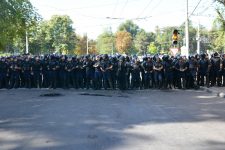Police Power to Pick Who to Prosecute

We recently wrote a blog about NSW Premier Mike Baird, who was caught doing an illegal U-turn and not wearing a seat belt during a double demerits long weekend.
The highway patrol officer who pulled Baird over decided to let him off without any fine.
But apparently Baird’s conscience later got the better of him, and he handed himself into police, who then issued him with a fine for the illegal U-turn, but not the seat belt offence.
This meant that Baird avoided the fine and 6 demerit points he would have received for the seat belt offence, as it occurred during a double demerits period.
While some members of the public praised Baird for handing himself in, others have raised concerns about why police are allowed to issue fines to some, while letting others off scot-free.
This blog looks at the extent to which police can use their discretion when deciding whether or not to issue fines or charge people with offences – and why certain people are more liable to prosecution than others.
Making Decisions: What Does the Law Say?
Several sections of the Law Enforcement (Powers and Responsibilities) Act 2002 (‘the LEPRA’) are worded in such a way as to give police a considerable amount of discretion when it comes to deciding whether or not to exercise their powers.
For instance, section 99 states that police are able to arrest a person without a warrant if they ‘suspect on reasonable grounds that the person is committing or has committed an offence,’ or if they believe that the arrest is ‘reasonably necessary’ for a variety of reasons, such as:
1. To stop a person fleeing from a police officer;
2. To stop a person committing or repeating an offence, or;
3. Because of the nature and seriousness of the offence.
Police are also the first to make decisions about bail; in other words, to decide whether a person will be released from custody until their case comes before a court.
When deciding bail, police are meant to consider several factors in the Bail Act that are relevant to whether an arrested person is an ‘unacceptable risk.’
In deciding whether to take or keep someone in custody, police are meant to make a judgment call without regard to characteristics such as their race, gender, socioeconomic status or other irrelevant personal features.
However, many studies have shown that police frequently exercise their powers unfairly against vulnerable and disadvantaged groups; resulting in members of those groups being arrested and refused bail far more often than others.
Discretion in Specific Situations
As the police spokesman said in the case of Mike Baird:
“All officers have the legal authority to use discretion in the performance of their duty,” and “every officer is taught the use of discretion is a very important tool in their kitbag”.
Police can indeed exercise their discretion in relation to a range of offences.
Minor traffic offences are a prime example, where police have broad discretion to issue a ticket or to let someone off with a caution.
Another example is ‘offensive language’, where police can decide whether to ignore a person’s use of profanity, to issue an on-the-spot fine, or to arrest and charge them – in which case they will have to go to court and face the possibility of a criminal conviction.
Yet another example is where an adult is caught smoking cannabis or possessing a smoking implement, or possessing 15 grams of less of cannabis. In these cases, police can decide to issue a ‘cannabis caution’ for drug possession rather than sending the person to court.
In many instances, police do not even need to give reasons for their exercise of discretion.
Does Discretion Lead to Discrimination?
While it is understandable that police require a certain level of discretion to carry out their duties, the experience of many minority groups is that discretion is exercised unfairly, with marginalised groups often being targeted.
For example, criminal defence lawyers working for the Aboriginal Legal Service have long spoken of the ‘trifecta of charges.’
This colloquialism refers to situations where police aggressively confront Indigenous Australians for using offensive language in public, before escalating the situation to the point where the person is charged with resisting arrest and assaulting police.
The fact that Indigenous Australians are so frequently targeted by police for minor offences – which “white” Australians would arguably get away with scot-free – is said to be one of many reasons for the over-representation of Aboriginal people in custody.
Indeed, the Human Rights Commission reported that Indigenous Australians are 17.3 times more likely to be arrested than non-Indigenous Australians.
Another example of unfair targeting occurred in 2013, when the Victorian Police Force conducted an inquiry into their cultural awareness training after numerous reports surfaced about the blatant discrimination and racial profiling experienced by young Sudanese men at the hands of police.
According to the six men who brought the complaint, Victorian police constantly harassed them, accusing them of “loitering” and being involved in criminal activity.
The men were regularly stopped and questioned by police without sufficient justification, and were routinely taunted and bullied. Despite this, not one of the men had ever been guilty of an offence.
Police diary notes included statements such as: ‘Unable to provide police with reason of why they were there or what they were doing. Nervous in police presence,’ while another entry said that men were searched because they were ‘loitering around park bench near basketball court. High criminal area of robberies and assaults. All wearing ‘home boy/gangster’ clothing.’
Statistics backed the men’s claims, showing that African men in the area were 2.5 times more likely to be stopped and searched by police than Caucasian people.
In the end, the men settled their case out of court. While the outcome was favourable, it does not excuse the fact that police officers – who are supposed to set an example for others in the community – deliberately targeted the men on the basis of their skin colour and race.
We still have a long way to go before people of all cultural backgrounds are treated fairly by police when exercising their discretion, and unfortunately it is difficult to change entrenched attitudes, particularly when they are collectively held by a body such as the NSW Police Force.
We can only hope that as more and more people take a stand against discrimination – as so many have done in the recent Adam Goodes saga – disadvantaged groups will one day be free from discrimination, and police can use their vast degree of discretion more fairly.
Receive all of our articles weekly
Author






